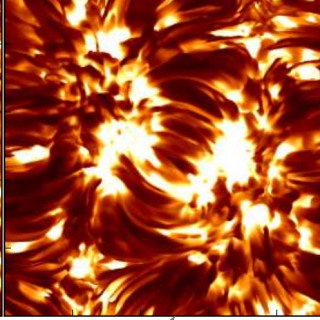Bibcode
Jurčák, J.; Rezaei, R.; Bello González, N.; Schlichenmaier, R.; Vomlel, J.
Referencia bibliográfica
Astronomy and Astrophysics, Volume 611, id.L4 13 pp.
Fecha de publicación:
3
2018
Revista
Número de citas
42
Número de citas referidas
40
Descripción
Context. Sunspots are the longest-known manifestation of solar activity,
and their magnetic nature has been known for more than a century.
Despite this, the boundary between umbrae and penumbrae, the two
fundamental sunspot regions, has hitherto been solely defined by an
intensity threshold. Aim. Here, we aim at studying the magnetic nature
of umbra-penumbra boundaries in sunspots of different sizes,
morphologies, evolutionary stages, and phases of the solar cycle.
Methods: We used a sample of 88 scans of the Hinode/SOT
spectropolarimeter to infer the magnetic field properties in at the
umbral boundaries. We defined these umbra-penumbra boundaries by an
intensity threshold and performed a statistical analysis of the magnetic
field properties on these boundaries. Results: We statistically
prove that the umbra-penumbra boundary in stable sunspots is
characterised by an invariant value of the vertical magnetic field
component: the vertical component of the magnetic field strength does
not depend on the umbra size, its morphology, and phase of the solar
cycle. With the statistical Bayesian inference, we find that the
strength of the vertical magnetic field component is, with a likelihood
of 99%, in the range of 1849-1885 G with the most probable value of 1867
G. In contrast, the magnetic field strength and inclination averaged
along individual boundaries are found to be dependent on the umbral
size: the larger the umbra, the stronger and more horizontal the
magnetic field at its boundary. Conclusions: The umbra and
penumbra of sunspots are separated by a boundary that has hitherto been
defined by an intensity threshold. We now unveil the empirical law of
the magnetic nature of the umbra-penumbra boundary in stable sunspots:
it is an invariant vertical component of the magnetic field.
Proyectos relacionados

Magnetismo, Polarización y Transferencia Radiativa en Astrofísica
Los campos magnéticos están presentes en todos los plasmas astrofísicos y controlan la mayor parte de la variabilidad que se observa en el Universo a escalas temporales intermedias. Se encuentran en estrellas, a lo largo de todo el diagrama de Hertzsprung-Russell, en galaxias, e incluso quizás en el medio intergaláctico. La polarización de la luz
Ernest
Alsina Ballester